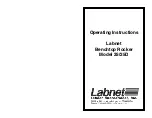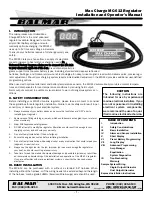
LISST-SL V2.1
User’s Guide
37
APPENDIX B: Purging the Pitot System
This section is best understood by watching a video, Appendix G.:
Trouble spots
1-13
Purging air from Cavity
Nose Removal
O-ring Placement
The pitot tube system consists of the
nozzle, the 35 micron screen in the pitot
cap, a cavity between the nose section
and the front bulk-head, and a
differential pressure sensor. There are
two places where problems may
develop. First, at the screen in the pitot
cap. Second, trapped air in the cavity.
Cleaning the fine screen in the pitot cap
is simple. Remove the screw-on pitot
cap, remove the screen behind the o-
ring, and replace with a cleaned or new
screen.
The removal of air from the cavity is
more complex and requires some time
and patience as you have to un-screw
the nose section from the front
bulkhead. You will then reassemble the
nose to the bulkhead
underwater
in a
tank.
Preparation of the pitot velocity sensor
prior to deployment can reduce the
need for purging the instrument in the
field. Remove the tail fin if it is
necessary to fit it into a tank of water. A
minimal tank size of 0.8 meter long, 0.3
meter wide, and 0.3 meter deep will be
required for this process. With the
provided nose wrench, remove the
nose.
The threads and the o-rings on the nose
piece require special attention. Dirt in
the threads can cause serious binding
and prevent the proper alignment and
sealing of the nose when screwing it
back on. A good quality zinc anti-seize
compound on the threads helps to
secure the nose in place when re-
assembling and prevents galling of the
threads.
After removing the nose:
There are three o-rings inside the nose
that need to be properly seated when
the nose is screwed back on. One large
o-ring (2-156) is a face seal outside the
thread diameter. Two other o-rings are
















































